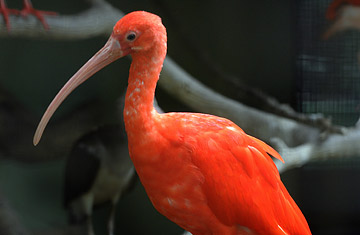
Scarlet Ibis, Trinidad
Afternoon in Caroni Swamp finds fanny-pack-clad, zoom-lens-toting tourists squeezed into pirogues motoring through the wetlands to catch a glimpse of the scarlet ibis, Trinidad's national bird. At sundown, some 10,000 of the vermillion-feathered, migratory waterfowl return from days spent in Venezuela, just nine miles away, to roost in the mangrove swamp south of Port of Spain. The window is brief, as a tropical sundown can seem as swift as a blanket thrown over a birdcage, but the ibis do not disappoint. In the day's last light, pack after pack of ibis fly in from the west, swoop in low over the sun-brightened water, alighting on an island of mangrove trees — one of eight or so roosting spots in the swamp — flecking the green-leaved trees with a crimson so bright it looks artificial. Their arrival is met with throaty gasps and the click of camera shutters.
But those tourists might be shocked to learn a fact unlikely to mentioned by their tour guides: The scarlet ibis can often be found in less majestic circumstances — stewed in a curry and served up on a plate. And thanks to rampant poaching to satisfy the unsavory hunger for the bird that shares the country's national crest with the cocrico, claimed as Tobago's bird, conservationists fear that the ibis will forsake Trinidad. "We'd hunt them in the early morning," says Seth, a 21-year-old swamp tour guide and reformed poacher who asked that his real name not be used for fear of jeopardizing the future career he hopes to have with the forest service. "We would leave a piece of red cloth near the roots of the mangroves," he said, where the ibis feeds on crabs, from whose shells they get the carotenes that turn their feathers scarlet. "They think they see their friend down there and they follow," explains Seth, who would have been lying in wait with a shotgun.
He would net between 18 and 20 birds per hunt, each one — barely meaty enough for a single serving — netting him about $30. But the birds are not poached to feed people who would otherwise go hungry, he says. "It's more of a vice, not for the people who live near the swamp, but the bigger people," restaurant owners in the rural south that serve it illegally and wealthy connoisseurs who have come to view eating scarlet ibis as a status symbol. (In 2001 the chairman of the country's airports authority was arrested for poaching scarlet ibis)
Chief Game Warden Antony Ramnarine says that although there have been about 25 poaching arrests so far this year, the bird population is not, in fact, threatened. The ibis are migratory by nature and move around the swamp, which is on Trinidad's west coast, in response to disturbances, so any perceived decline in numbers "doesn't mean a catastrophe." But conservationists say that eating scarlet ibis is merely emblematic of a country cannibalizing its natural resources through voracious industrial growth. "The habitat has been diminished steadily over the years," says John Agard, a lecturer in life sciences at the University of the West Indies. Petrochemical plants and the port itself are replacing the mangroves along the west coast, Agard notes, and from the north the city is expanding in the direction of the swamp. The highway on the swamp's eastern side chokes off the fresh water supply, changing the ecosystem of the swamp, which is also bounded by a sewage treatment plant and a garbage dump. That there are still plenty of birds in Caroni is "an illusion," Agard warns. "The local colony is not doing so well," he says, and when their habitat is gone, the colony from the Venezuelan coast, which is rimmed by miles of unmolested mangroves, will bypass Trinidad, roosting elsewhere in the Caribbean. (Warden Ramnarine says he has not seen any signs of the negative affects of industrialization.)
One problem conservationists claim is hampering their effort to protect the ibis is insufficient legal protection for the birds. There is no law prohibiting access to the swamp, says Agard, and though Caroni is listed as a protected under the Ramsar Convention, an international intergovernmental wetlands treaty, adequate local legislation has not been enacted. Diminishing the urgency, conservationists say, is the fact that the scarlet ibis is not an endangered species; it's just endangered on the island of Trinidad. When the Venezuelan colony abandons Trinidad, a smaller flock resident on the island, which needs the interlopers to keep their gene pool deep, will wither, says Molly Gaskin, president of the Point-a-Pierre wild fowl trust where she oversees a breeding and reintroduction program for scarlet ibis. "We don't have an activism-oriented population; we'll need a catastrophe before that happens," Gaskin said. Oil and gas expansion, she said, is for short-term gain, "and when the well known and wealthy say 'I've got ibis on the table,' that encourages the small-time stuff." The way things are headed, Gaskin says, Trinidad's national bird will have to be the carrion buzzard.
